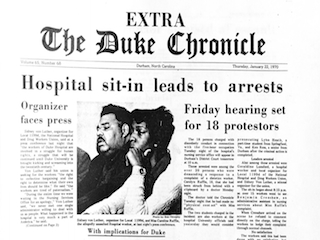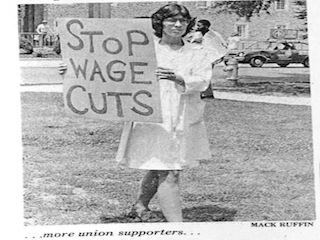Union Organizing at Duke Hospital
Duke University Hospital workers fought for the opportunity for collective power in the face of an institutionally discriminatory Duke Hospital Administration… With worker’s rights movements buzzing around Duke’s campus starting in the late 1960s, the Duke Medical Center was on the verge of drastic changes. In 1974, Duke Medical Center workers had finally reached their tipping point.
Workers were dissatisfied with Duke Hospital’s half-hearted attempt to address racial inequality, because while the percentage of black workers at the hospital perfectly reflected the percentage of black residents in Durham, these black workers were only employed in lower level jobs and had no representation in the hospital administration.
With no representation, when the administration cut black workers salaries and increased hours, there was no one to fight for what was in their best interest. So, In I974, when the National Labor Relations Act was amended to allow employees of nonprofit Hospitals to unionize, lower level Duke Medical Center workers made their first efforts to gain collective bargaining power by campaigning for unionization.
The workers employed the help of Howard Fuller and the American Federation of State, County, and Municipal Employees Local chapter 77 to manage the campaign for unionization. They organized hospital walkouts, sit ins, pamphlets, and media involvement to increase awareness of the value of unionizing. But once the hospital administration began to realize that unionization effort was gaining momentum, they distributed anti-union propaganda, hired a union busting management company, and packed the Nation Labor Relations Board union election with white, high level staffers.
As a result, not only did the 1974 unionization drive fail, but that failure also discouraged future worker’s participation and led to the failure of the 1978 hospital unionization drive as well. Still to this day there have been a concentration of black hospital workers in the lower level jobs while as recently as 2002 a registered nurse claimed to be fired for unionization efforts.[1] Although unsuccessful, the 1974 hospital unionization drive sparked the 30 year conversation about workers rights and Duke University’s failure to uphold those rights
[1] http://en.wikipedia.org/wiki/Duke_University_Hospital_Unionization_Drives


